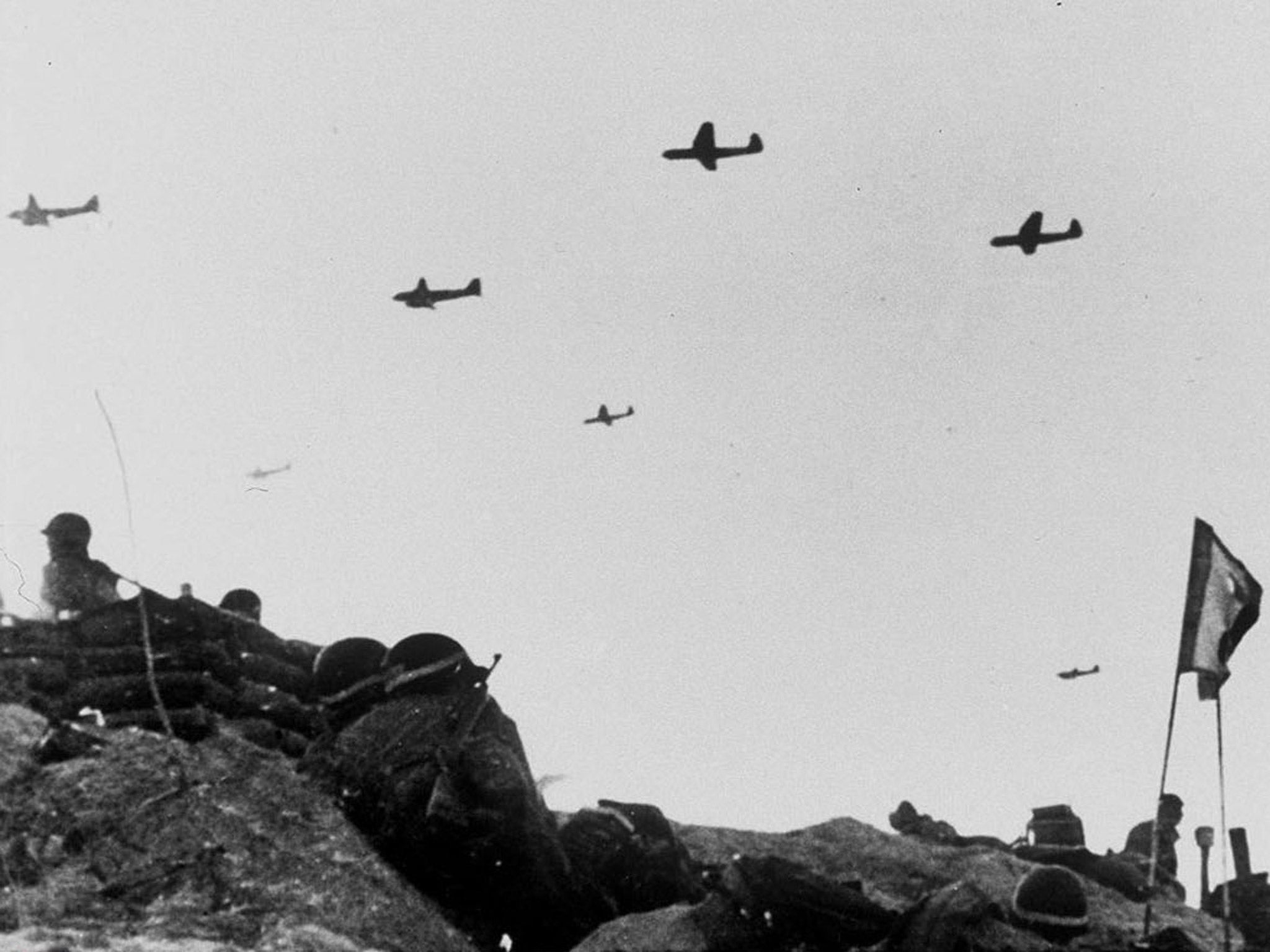Hero D-Day pilot, last surviving light bomber who laid down smokescreen for invading troops, dies aged 95

Your support helps us to tell the story
From reproductive rights to climate change to Big Tech, The Independent is on the ground when the story is developing. Whether it's investigating the financials of Elon Musk's pro-Trump PAC or producing our latest documentary, 'The A Word', which shines a light on the American women fighting for reproductive rights, we know how important it is to parse out the facts from the messaging.
At such a critical moment in US history, we need reporters on the ground. Your donation allows us to keep sending journalists to speak to both sides of the story.
The Independent is trusted by Americans across the entire political spectrum. And unlike many other quality news outlets, we choose not to lock Americans out of our reporting and analysis with paywalls. We believe quality journalism should be available to everyone, paid for by those who can afford it.
Your support makes all the difference.The last surviving British D-Day light bomber pilot, who laid smoke over the beaches during a heroic mission to shield the Allied forces from enemy fire, has died, aged 95.
RAF Flying Officer Leslie Valentine, from Hethe, Oxfordshire, received the Defence Medal for the vital role he played in the D-Day invasion in 1944.
Then aged 24, he flew his Douglas Boston E Easy light bomber fast and low, 50 ft above the Normandy shoreline amid a barrage from Royal Navy gunships and German 88 heavy artillery defences.
Two planes were lost but in the mission to lay down protecting smoke for the invading forces, but Flt Officer Valentine returned safely to his base in Hampshire.
Flying 60 operations back-to-back during the war, Mr Valentine carried out many other sorties across France, sabotaging supply lines to disrupt transport of enemy reinforcements.
His targets included road bridges, rail yards, road transport convoys, submarine pens and V1 rocket launching sites.
Mr Valentine, who died at a nursing home, was one of two British servicemen who held the Croix de Guerre [war cross] with Silver Star, one of France's highest accolades for heroic deeds performed in the liberation of France.
He originally missed out receiving the Defence Medal for his service with the Highland Light Infantry because he had volunteered for the RAF and went off training.
The Government rectified the oversight in 2012, when Mr Valentine was presented with his Medal by David Cameron at Downing Street.
The Prime Minister hailed the Glasgow-born Mr Valentine’s “extraordinary bravery”.
Remembering the mission, Mr Valentine said: "I’d anticipated that it was going to be a little hairy. I had just 46 seconds to let off four canisters of smoke.
“The Germans were only half a mile back off the beach. The noise of the shells was deafening. Not only was there the chance of being hit in the crossfire but, as the UK forces on the ground were unsure who the aircraft flying so low above them were, they also let fly with small arms fire.
“I was flying at 250mph at only 50ft. I had to hold it very steady - at that speed and height if I'd even sneezed that would have been it.”
He returned to the Normandy beaches in France last May as guest of honour at an Armistice Day commemoration.
His son Dudley Valentine said: “He came back very, very proud and poignant and talked about [WW2] probably more than he had ever talked about it before."
He added: “It wasn't until the last perhaps 10 years that he ever really spoke about it. He certainly never spoke about it with the family.”
Light bombers, often single-engine aircraft with a bomb load of about 500-1,000 kg, were mostly used to strafe installations or ground forces during the war, due to their speed.
Heavy bombers, attacking from greater heights, would be used for large-scale bombardment of cities
Light bombers, which had few or no defensive guns, fell out of usage after the Second World War as specialised attack fighters grew in size and power.
900 members of the British Normandy Veterans’ Association plan to be among thousands returning to the former battleground for the June commemoration of the Normandy landings.
D-Day veterans Normandy commemoration thwarted by French bureaucracy
British D-Day veterans planning to attend their last official commemoration of the Normandy landings in June claim that they are being thwarted by French bureaucracy.
Some 900 members of British Normandy Veterans’ Association - many of whom are in their 90s - have been told they will not be allowed past security unless they complete a detailed form.
The veterans had been given just days to fill in the form which requires details of their rank, regiment, unit, “role” during D-Day, medals awarded, events they plan to attend, travel plans, home address, email address, place of birth, age, contact numbers, “maiden name if applicable” and whether they want to speak to the media.
The French authorities say they will bar anyone from entering the Carentan peninsula without an official pass.
The 70th anniversary commemoration is the last official event marked by the Normandy Veterans’ Association, which will disband in November.
Join our commenting forum
Join thought-provoking conversations, follow other Independent readers and see their replies
Comments